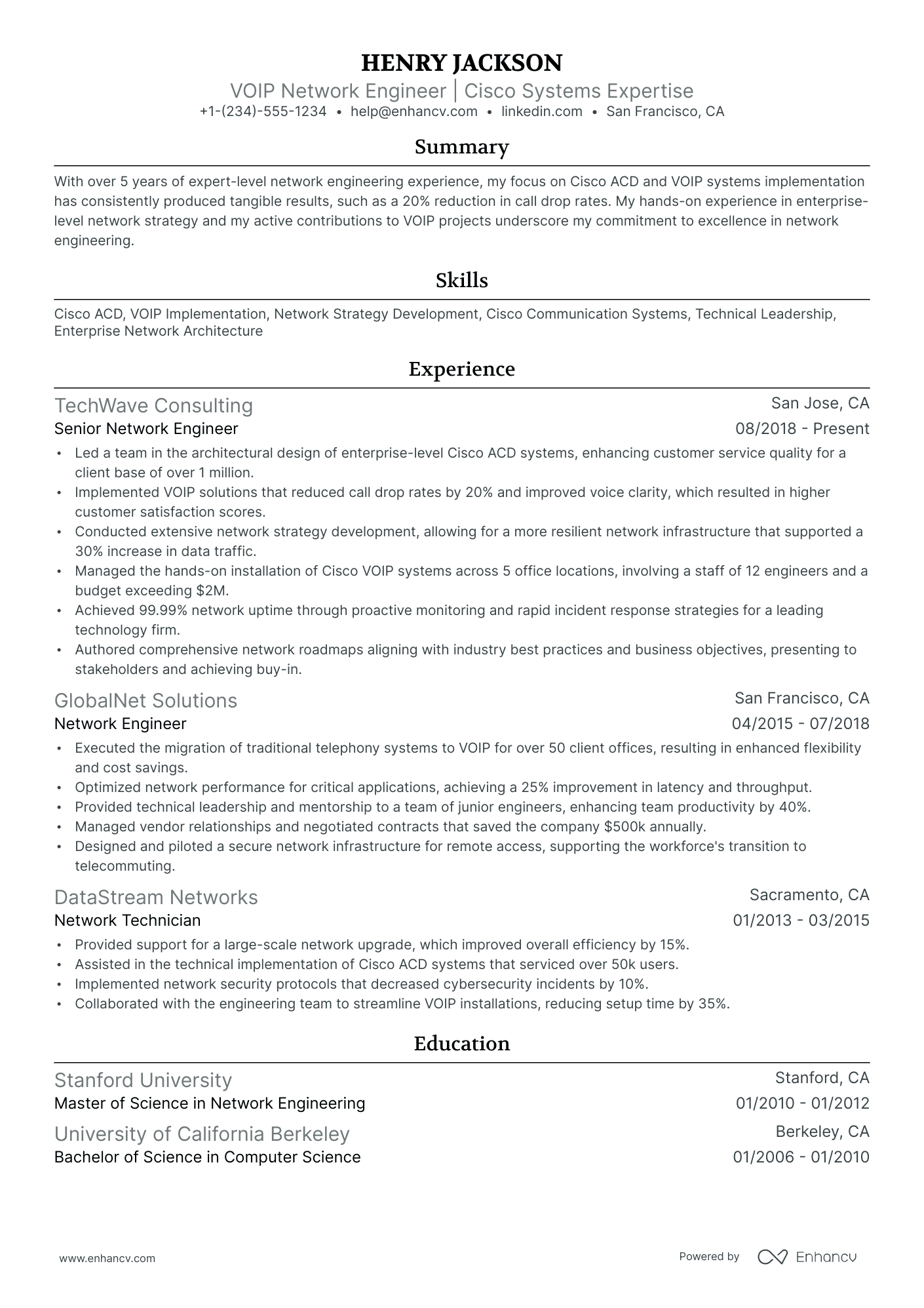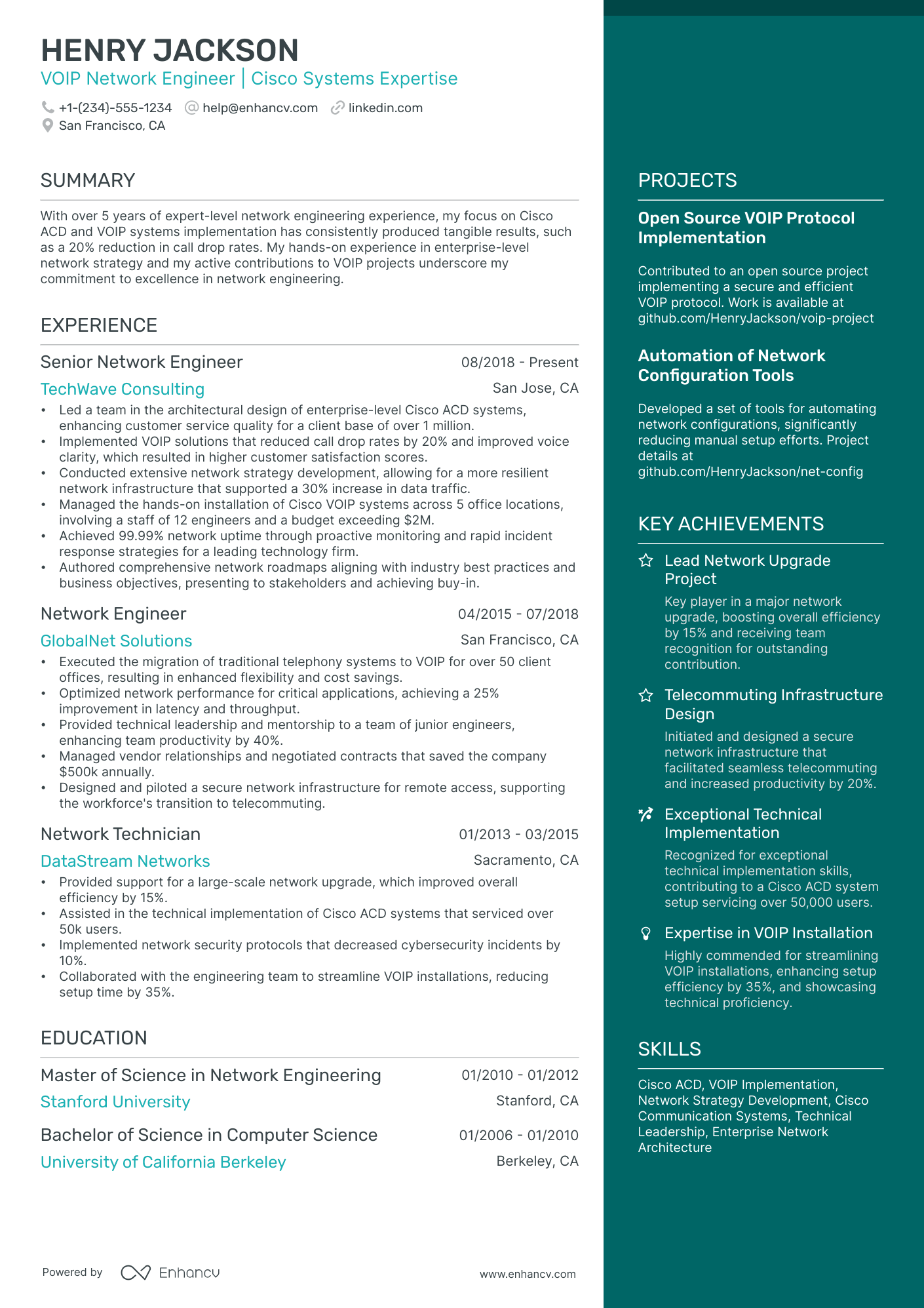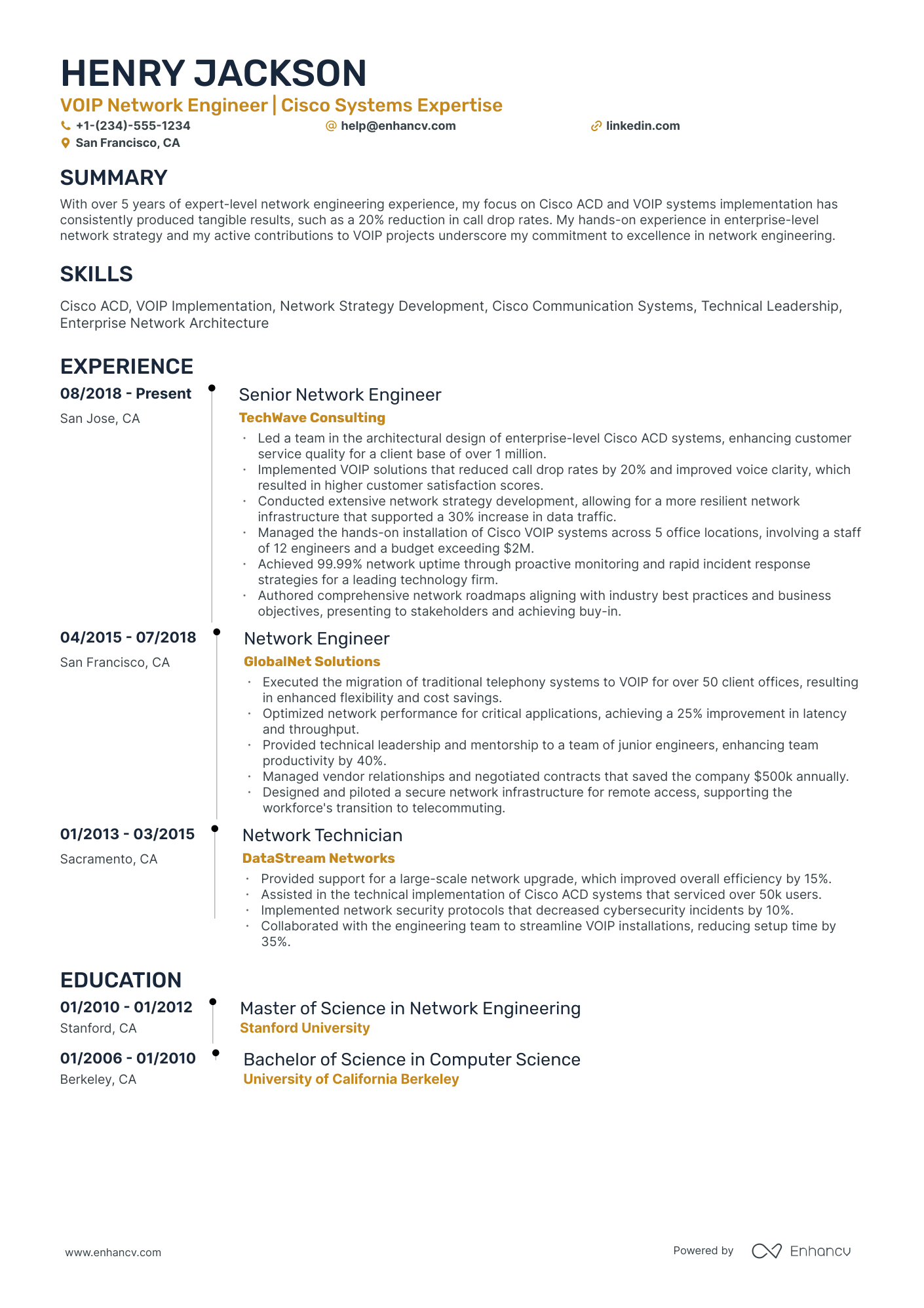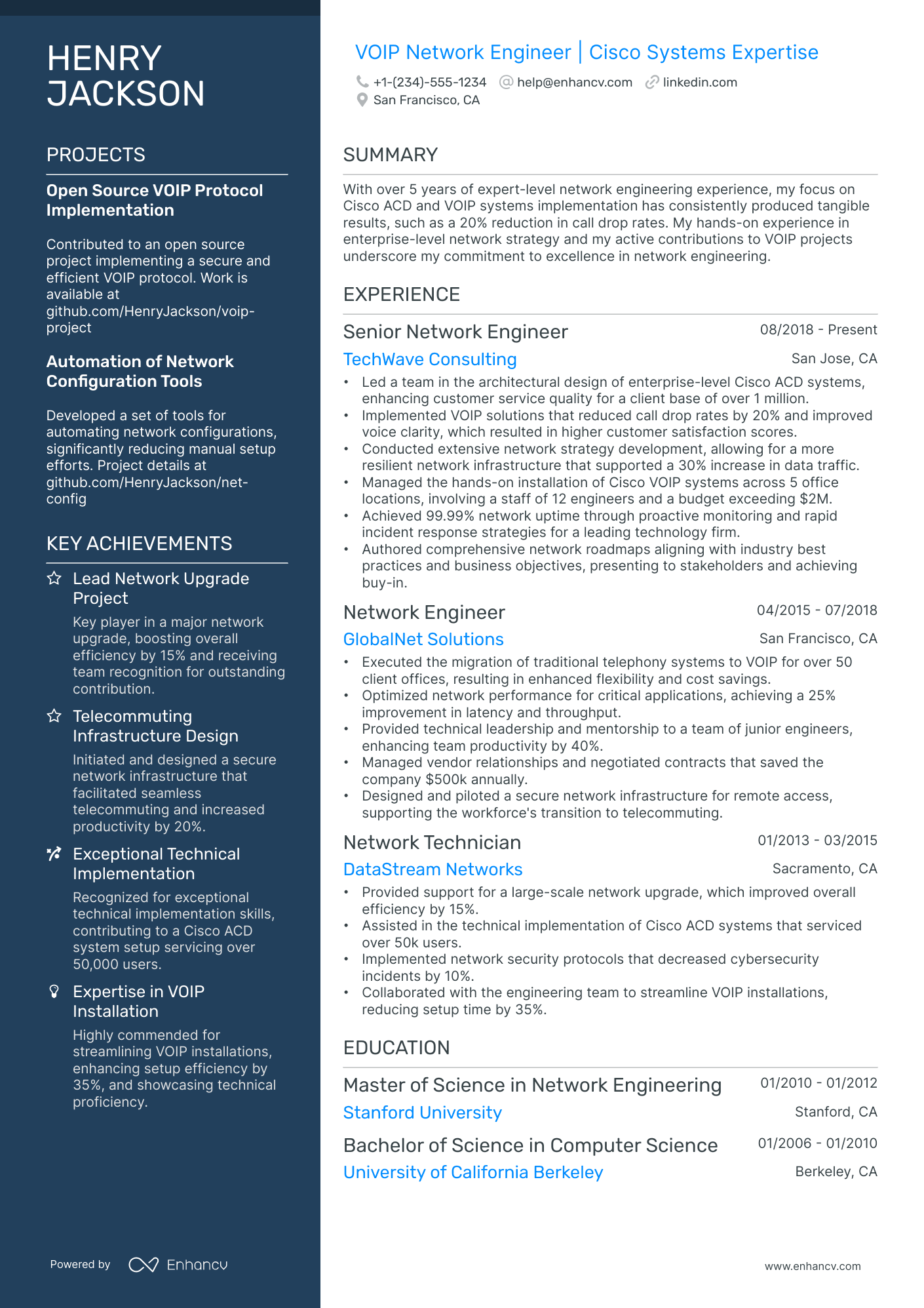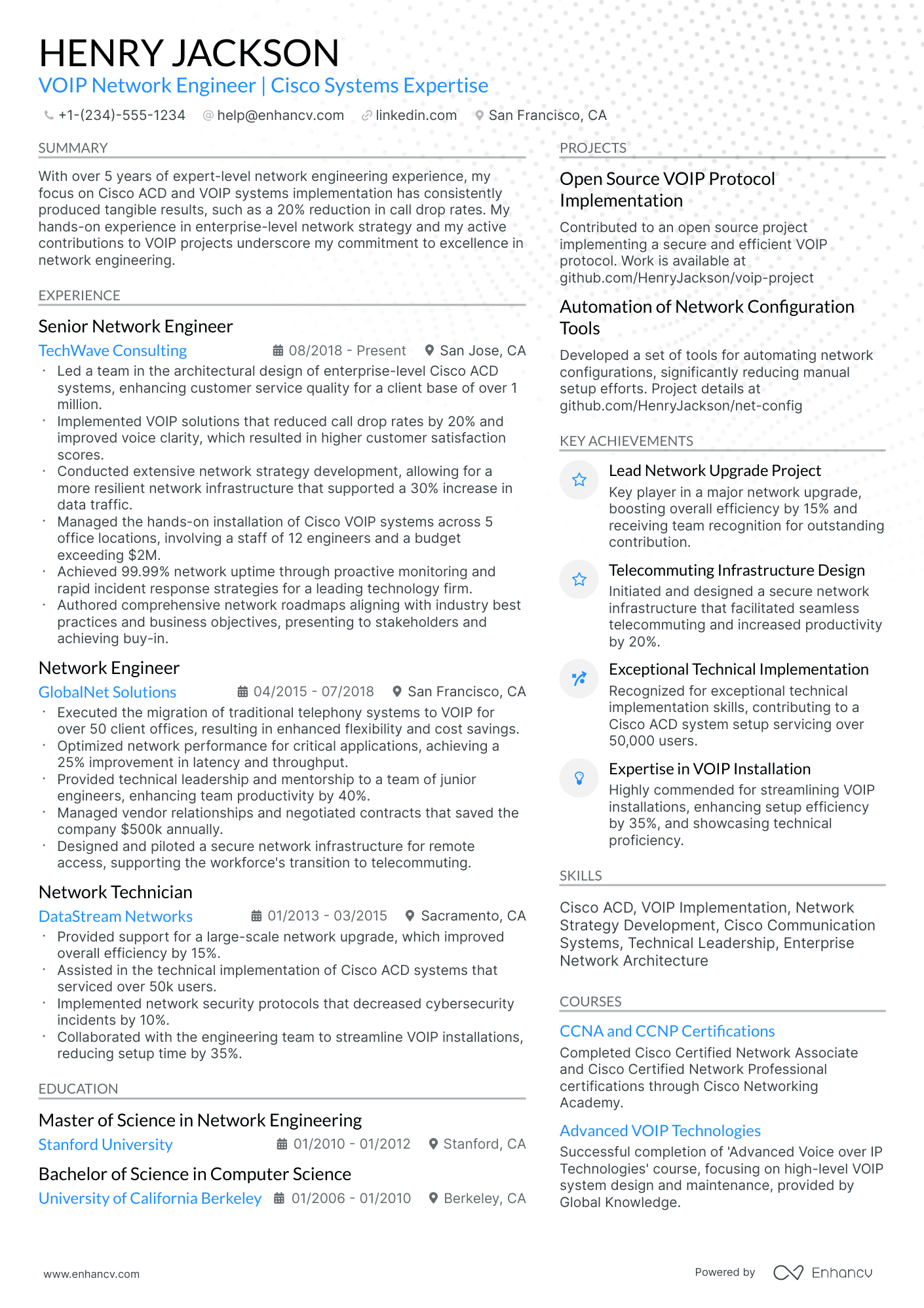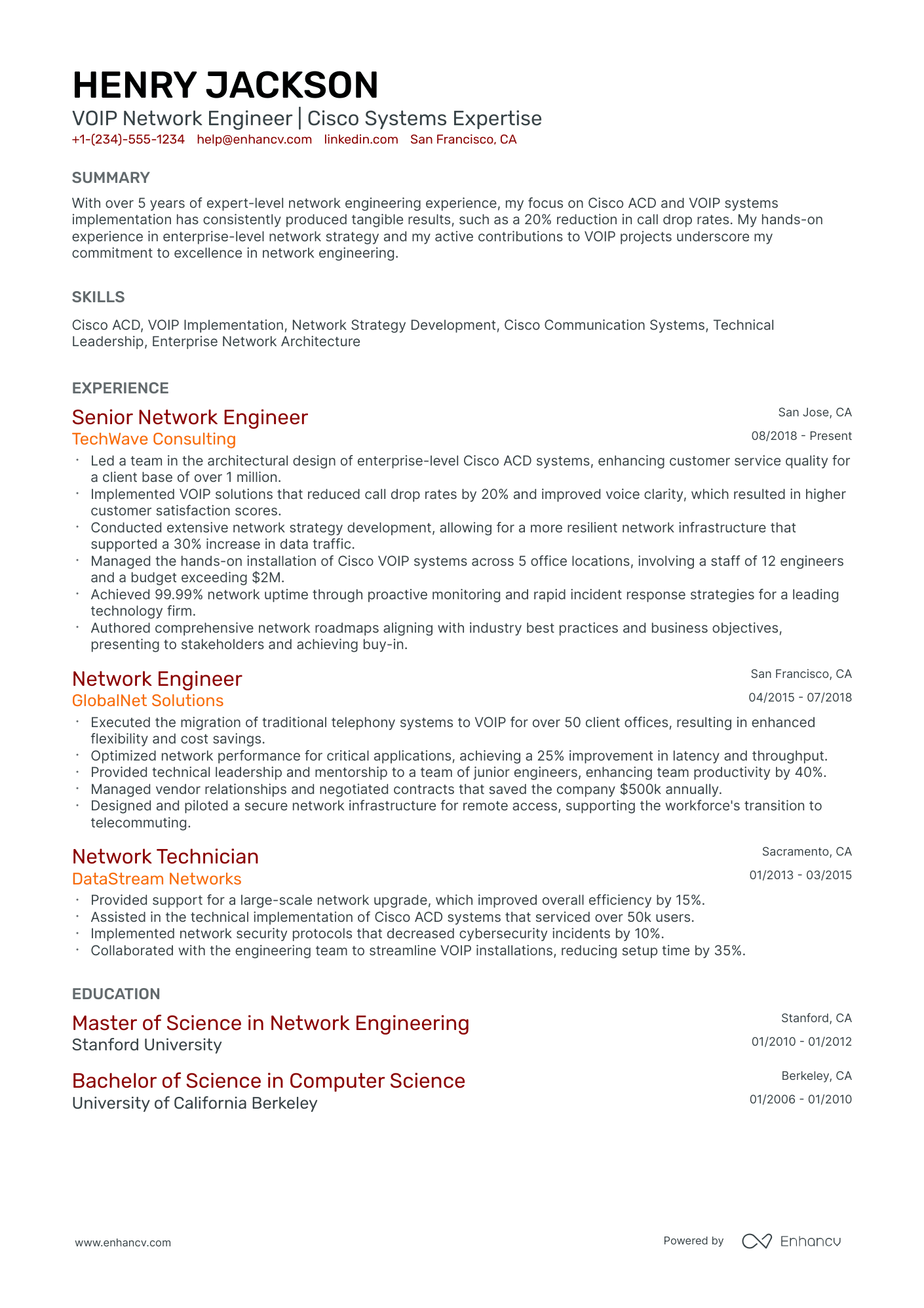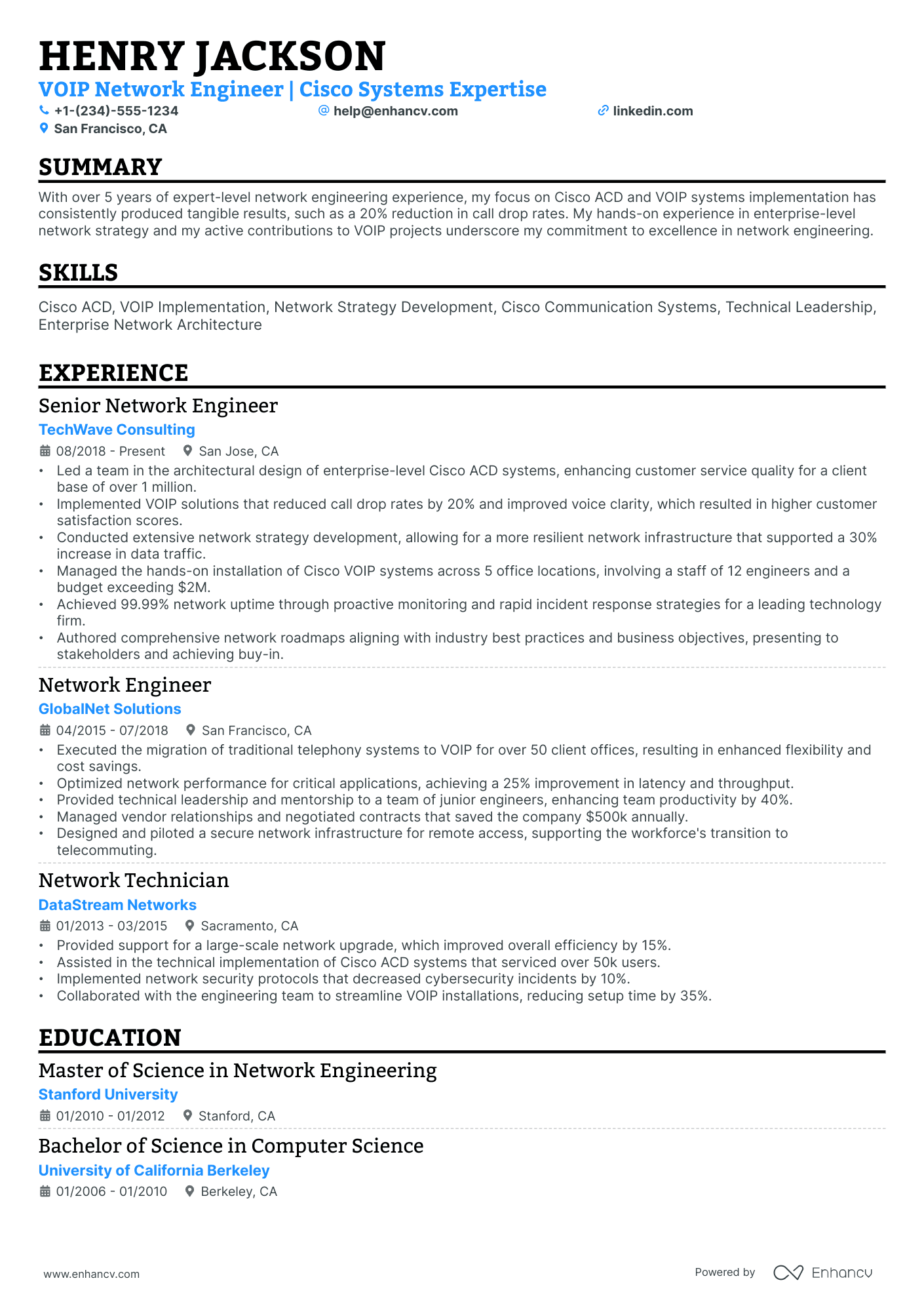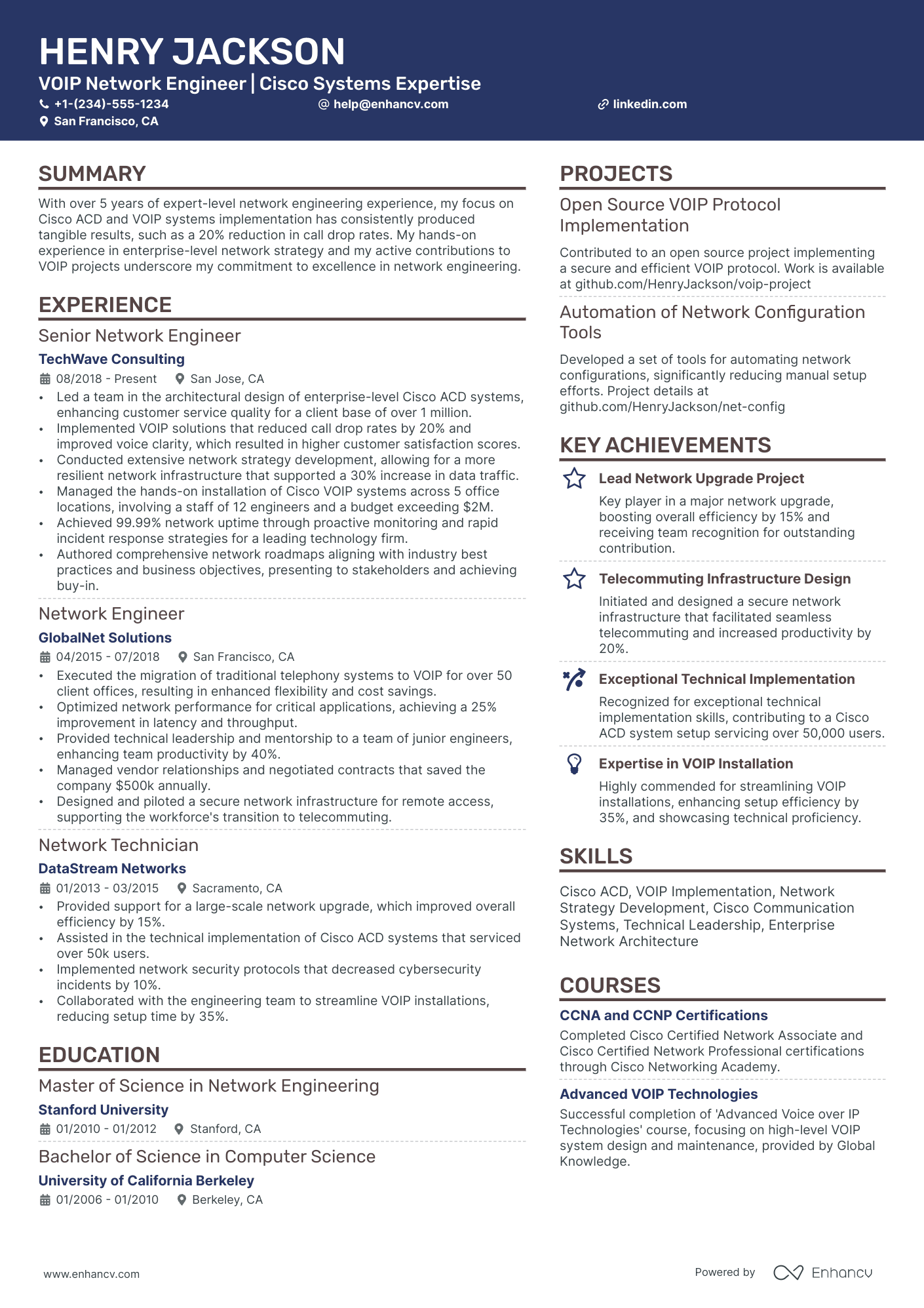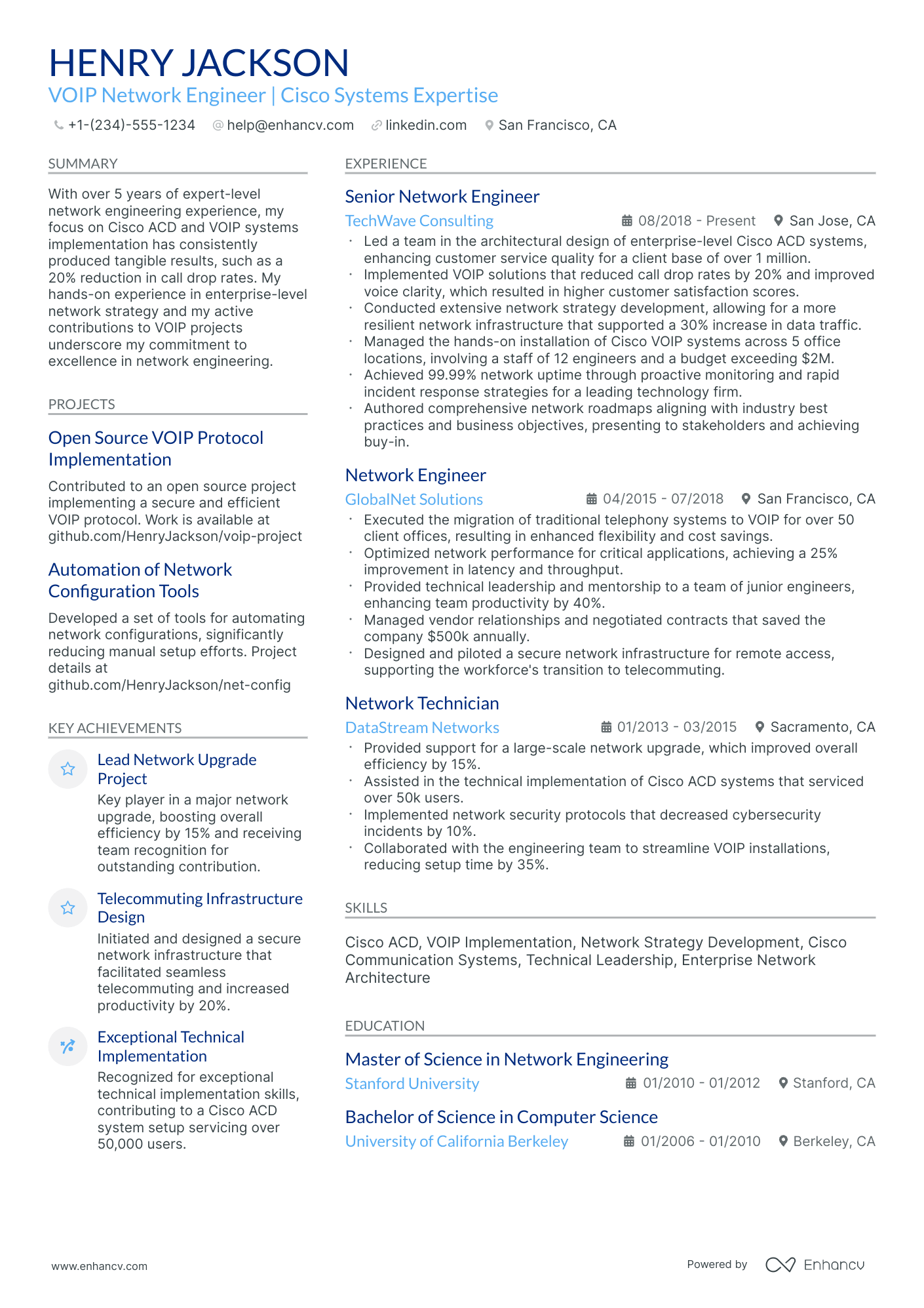As a VoiP network engineer, articulating your diverse technical expertise and experiences on a resume can be challenging, often making it difficult to stand out to employers in a competitive job market. Our guide provides you with industry-focused tips and templates, ensuring you effectively highlight your VOIP skills, projects, and achievements to catch a recruiter's eye.
- Find different VoiP network engineer resume examples to serve as inspiration to your professional presentation.
- How to use the summary or objective to highlight your career achievements.
- How to create the experience section to tell your story.
- Must have certificates and what to include in the education section of your resume.
If the VoiP network engineer resume isn't the right one for you, take a look at other related guides we have:
- Technology Manager Resume Example
- Security Director Resume Example
- Aws Network Engineer Resume Example
- IT Service Delivery Manager Resume Example
- Python Full Stack Developer Resume Example
- Sophomore Engineering Resume Example
- System Analyst Resume Example
- Application Engineer Resume Example
- System And Network Engineer Resume Example
- IT Infrastructure Project Manager Resume Example
Enhancing your VoiP network engineer resume: format and layout tips
"Less is more" - this principle is key for your VoiP network engineer resume design. It emphasizes the importance of focusing on why you're the ideal candidate. Simultaneously, it's crucial to select a resume design that is both clear and simple, ensuring your qualifications are easily readable.
Four popular formatting rules (and an additional tip) are here to optimize your VoiP network engineer resume:
- Listing experience in reverse chronological order - start with your most recent job experiences. This layout helps recruiters see your career progression and emphasizes your most relevant roles.
- Including contact details in the header - make sure your contact information is easily accessible at the top of your resume. In the header, you might also include a professional photo.
- Aligning your expertise with the job requirements - this involves adding essential sections such as experience, skills, and education that match the job you're applying for.
- Curating your expertise on a single page - if your experience spans over a decade, a two-page resume is also acceptable.
Bonus tip: Ensure your VoiP network engineer resume is in PDF format when submitting. This format maintains the integrity of images, icons, and layout, making your resume easier to share.
Finally, concerning your resume format and the Applicant Tracker System (ATS):
- Use simple yet modern fonts like Rubik, Lato, Montserrat, etc.
- All serif and sans-serif fonts are friendly to ATS systems. Avoid script fonts that look like handwriting, however.
- Fonts such as Ariel and Times New Roman are suitable, though commonly used.
- Both single and double-column resumes can perform well with the ATS.
Remember, resume layouts can vary by country – for example, a Canadian resume format could look different.
Upload & Check Your Resume
Drop your resume here or choose a file. PDF & DOCX only. Max 2MB file size.
PRO TIP
The more time and effort you've put into obtaining the relevant certificate, the closer to the top it should be listed. This is especially important for more senior roles and if the company you're applying for is more forward-facing.
Recruiters' preferred VoiP network engineer resume sections:
- A header with relevant contact information and headline, listing your current job title
- A resume summary or objective pinpointing what is most impressive about your expertise (that aligns with the role)
- An experience section highlighting the specifics of your responsibilities and achievements
- A skills sidebar to intertwine job advert keywords with your unique talents
- An education and certifications sections to serve as further accreditation to your professional experience
What recruiters want to see on your resume:
- Hands-on experience with VoIP protocols such as SIP, RTP, TLS, and SRTP, and understanding of network protocols like IP, TCP, UDP, and QoS strategies
- Knowledge of VoIP systems, including PBX setup, call routing, voicemail management, and session border controllers (SBCs)
- Experience with VoIP troubleshooting tools and techniques for diagnosing and resolving network and voice quality issues
- Proficiency with network equipment, such as routers, switches, and firewalls, especially in configurations pertinent to VoIP operations
- Familiarity with VoIP security practices, such as securing endpoints, encryption, and protection against DoS attacks and toll fraud
Experts' advice on writing your VoiP network engineer resume experience
While the excitement and motivation for writing your VoiP network engineer resume was present in the first hour (or so), you now find yourself staring at the blank page.
The resume experience section is the one that allows you to make a memorable impression by matching job requirement with your past jobs and accomplishments.
To help you write this resume section, here are four mistakes you need to avoid:
- Listing every job you have had so far, including the irrelevant ones. Before that, consider each of your past roles based on relevancy to the role. It may be the case that the job you had 15 years ago may have taught you invaluable skills that are appropriate for the role;
- Including irrelevant work experience items. Those are past jobs that aren't linked with the role you're applying for (or so they seem). Consider how your past jobs will serve your professional presentation: will they be filling in a gap in your work history, or just taking up space?
- Focusing on responsibilities instead of accomplishments. Your VoiP network engineer resume shouldn't just be telling recruiters what you did in the past - as it's most often the case that candidates have had similar responsibilities. But, rather, the experience section should showcase the success you've attained in each past role, thanks to your unique skill set;
- Consider listing just your professional experience. Any role you've had in the past - e.g. volunteering, internships, etc. - can make it into your VoiP network engineer resume experience section. Make sure to include it alongside numbers and results.
Two more things you need to remember about your resume experience section.
The first are keywords. Or those specific job requirements that are crucial for the role . Ensure you've integrated them across your experience section to get sorted closer to the ideal candidate profile by the Applicant Tracker System (ATS).
The second are action verbs. Each of your experience bullets should start with a strong action verb, followed by your specific skill and your on the job achievements. Follow this formula to hint to recruiters what your unique value as a professional is.
Still with us? In the next section, we will show you how industry-leading professionals have avoided the four most common mistakes, while integrating keywords and action verbs in their experience section.
- Engineered and deployed scalable VOIP solutions for over 500 users within the organization, significantly reducing communication costs.
- Led a team in upgrading the existing PBX system to a SIP-based infrastructure to improve call quality and network reliability.
- Developed custom IVR applications to streamline customer interactions, which enhanced the customer service experience and increased efficiency.
- Designed and implemented secure network solutions for VOIP systems, successfully preventing any intrusion attempts over a 3-year period.
- Provided training and mentorship to junior engineers, improving team skill set and reducing resolution time for VOIP-related issues.
- Managed and optimized VOIP network operations, achieving a 99.99% uptime for all communication services.
- Conducted detailed data analysis to track and minimize bandwidth utilization, leading to a 20% reduction in operational costs.
- Implemented a VOIP system for a new call center, enabling the support for an additional 1500 concurrent calls.
- Spearheaded the migration of traditional telephony systems to a centralized VOIP platform, reducing overhead by 30%.
- Oversee the deployment of VOIP networks across multiple international sites, ensuring consistent and reliable service according to business needs.
- Collaborate with cross-functional teams to integrate VOIP technology with business applications, increasing overall productivity by 25%.
- Developed and maintained a comprehensive disaster recovery plan for VOIP infrastructure, effectively mitigating risks associated with unexpected downtimes.
- Negotiated with service providers to secure competitive pricing, which resulted in an annual saving of $100000 for the company.
- Conducted regular security audits and vulnerability assessments on the VOIP infrastructure, fostering a secure communications environment.
- Streamlined voice traffic routing by redesigning the QoS policies, which improved call quality for remote users by 40%.
- Orchestrated the seamless transition from legacy telephony systems to a comprehensive VOIP suite for a large enterprise, involving over 10,000 endpoints.
- Authored technical documentation and best practice guides that have been adopted company-wide, enhancing the knowledge base of the entire IT department.
Quantifying impact on your resume
- Include the number of VoIP deployments you have successfully managed, demonstrating your experience and project management skills.
- List the percentage of downtime reduction achieved through your network optimizations to show your effectiveness in improving service reliability.
- Mention the total number of users supported in your VoIP network to indicate the scale of your technical support capabilities.
- Specify the amount of cost savings generated from VoIP solutions you implemented, highlighting your ability to drive efficiency and profitability.
- Quantify the number of VoIP-related troubleshooting incidents you've resolved to showcase your problem-solving skills.
- Present the size of the teams you have led or collaborated with, illustrating your leadership and teamwork skills.
- Measure the improvements in voice quality (e.g., MOS scores) you achieved through network adjustments, affirming your attention to service quality.
- Detail the number of training sessions conducted or certifications obtained, reflecting your commitment to professional development and knowledge sharing.
Action verbs for your VoiP network engineer resume
How to shift the focus from your VoiP network engineer resume experience section to your professional profile
If you're at the start of your career journey or transitioning industries, you might be concerned about the lack of professional experience while crafting your VoiP network engineer resume.
How can you effectively present your VoiP network engineer resume experience section under these circumstances?
Rather than a traditional, extensive experience section, demonstrate your expertise through:
- Emphasizing your education. Your academic background might impress recruiters, especially if it includes recent, industry-relevant knowledge;
- Creating a compelling objective statement. The first few sentences of your resume should map out your motivations and career aspirations, offering insight into your goals;
- Highlighting your transferable skills. For example, if you've honed communication skills through volunteering, illustrate on your VoiP network engineer resume how these can benefit a potential employer;
- Detailing your technical background in certifications and skills sections. As a recent graduate, your technological foundations might be particularly attractive to employers looking to develop these skills further.
It's important to remember that employers sometimes prefer candidates with less experience but who are a better cultural fit for their organization.
Recommended reads:
PRO TIP
The more time and effort you've put into obtaining the relevant certificate, the closer to the top it should be listed. This is especially important for more senior roles and if the company you're applying for is more forward-facing.
Featuring your hard skills and soft skills on your VoiP network engineer resume
The skills section of your VoiP network engineer resume needs to your various capabilities that align with the job requirements. List hard skills (or technical skills) to showcase to potential employers that you're perfectly apt at dealing with technological innovations and niche software. Meanwhile, your soft skills need to detail how you'd thrive within your new, potential environment with personal skills (e.g. resilience, negotiation, organization, etc.) Your VoiP network engineer resume skills section needs to include both types of skills to promote how you're both technical and cultural fit. Here's how to create your bespoke VoiP network engineer skills section to help you stand out:
- Focus on skill requirements that are listed toward the top of the job advert.
- Include niche skills that you've worked hard to obtain.
- Select specific soft skills that match the company (or the department) culture.
- Cover some of the basic job requirements by including important skills for the VoiP network engineer role - ones you haven't been able to list through the rest of your resume.
Get inspired with our VoiP network engineer sample skill list to list some of the most prominent hard and soft skills across the field.
Top skills for your VoiP network engineer resume:
SIP (Session Initiation Protocol)
VoIP (Voice over IP) Technologies
IP Networking (TCP/IP, Subnetting)
QoS (Quality of Service)
Cisco Unified Communications
Asterisk
Network Security (Firewalls, VPNs)
Packet Analysis (Wireshark)
PBX Systems
Network Monitoring Tools
Problem-Solving
Communication
Team Collaboration
Time Management
Adaptability
Attention to Detail
Critical Thinking
Customer Service Orientation
Project Management
Analytical Skills
PRO TIP
Listing your relevant degrees or certificates on your VoiP network engineer resume is a win-win situation. Not only does it hint at your technical capabilities in the industry, but an array of soft skills, like perseverance, adaptability, and motivation.
Discover the perfect certification and education to list on your VoiP network engineer resume
Value the insights your resume education section offers. It can shed light on various proficiencies and experiences tailored for the job.
- Add only college or university degrees, stating the institution and duration.
- If you're nearing the end of your degree, note your graduation date.
- Weigh the pros and cons of including unrelated degrees - it might not be your best choice with so little space on your resume.
- Talk about your educational achievements if they amplify your relevant experience.
There are so many certificates you can list on your resume.
Just which ones should make the cut?
- List your prominent higher education degree in a separate box, alongside the name of the institute you've obtained it from and your graduation dates
- Curate only relevant certificates that support your expertise, hard skills, and soft skills
- Certificates that are more niche (and rare) within the industry could be listed closer to the top. Also, this space could be dedicated to more recent certifications you've attained
- Add a description to your certificates or education, only if you deem this could further enhance your chances of showcasing your unique skill set
When listing your certificates, remember that it isn't a case of "the more, the merrier", but rather "the more applicable they are to the industry, the better".
Recruiters have hinted that these are some of the most in-demand certificates for VoiP network engineer roles across the industry:
The top 5 certifications for your VoiP network engineer resume:
- Certified Information Systems Security Professional (CISSP) — (ISC)²
- Cisco Certified Network Professional Collaboration (CCNP Collaboration) — Cisco
- Avaya Certified Solutions Architect (ACSA) — Avaya
- Microsoft Certified: Azure Solutions Architect Expert (MCASE) — Microsoft
- VMware Certified Professional – Network Virtualization (VCP-NV) — VMware
PRO TIP
Listing your relevant degrees or certificates on your VoiP network engineer resume is a win-win situation. Not only does it hint at your technical capabilities in the industry, but an array of soft skills, like perseverance, adaptability, and motivation.
Recommended reads:
The VoiP network engineer resume summary or objective: integrating keywords, achievements, and more
Deciding whether to include a resume summary or an objective in your VoiP network engineer resume is crucial. Both serve as key introductory elements at the top of your resume, encapsulating your profile in up to five sentences and incorporating relevant keywords from the job advert.
Here are the key differences between the two:
- The resume summary focuses on aligning your achievements and experience with the job requirements. It provides recruiters with a snapshot of your expertise, helping you stand out as an ideal candidate for the role.
- The resume objective, on the other hand, centers on your career goals and aspirations, detailing how the role aligns with your career progression. It's particularly suitable for candidates with less professional experience or those new to the job market.
Below are examples demonstrating best practices in utilizing the resume summary and/or objective to make a strong first impression with your VoiP network engineer resume.
Resume summaries for a VoiP network engineer job
- Dynamic VoiP network engineer with over 8 years of experience optimizing real-time communication systems, spearheading the implementation of scalable VoIP solutions for a 1000+ user enterprise, and elevating system reliability by 30%. Proficient in SIP protocol, network security, and cloud PBX platforms, seeking to leverage extensive expertise to drive seamless communication experiences.
- Proven IT specialist with 6 years of network administration experience, transitioning into VoIP engineering after obtaining a Cisco Certified Network Professional (CCNP) Collaboration certification. Successfully executed a department-wide software upgrade improving system performance by 25%, possesses in-depth knowledge of network infrastructures and IP telephony, aiming to apply a robust technical foundation in a focused VoIP role.
- High-achieving Network Support Technician ready to transition to VoiP network engineering, holding a comprehensive understanding of wireless and wired network configurations, complemented by a recent certification in Avaya Solutions. Instrumental in reducing downtime by 20% at previous organization through proactive system monitoring and maintenance. Eager to apply transferable skills to master VoIP technologies and contribute to large-scale projects.
- Accomplished software developer making a strategic shift to VoiP network engineering, possessing 10 years of experience in programming cutting-edge solutions and robust client applications, including developing a patented chat application. Adept in Java, C++, and VoIP software stacks, committed to applying a multifaceted technical background to excel in designing and optimizing voice communication systems.
- Aspiring VoiP network engineer with a fervent interest in telecommunications and a Bachelor’s degree in Network Engineering. Though new to the field, brings a fresh perspective combined with recently-acquired certifications in Network+ and CCNA. Objective: to diligently apply theoretical knowledge and enthusiasm for digital communication technologies to contribute positively to the success of future VoIP networking projects.
- Motivated technologist eager to embark on a career as a VoiP network engineer, armed with a Master's degree in Information Technology and a personal drive to understand complex networking systems. With a background in computer science and hands-on experience with basic networking setups from academic projects, the objective is to channel a passion for tech and a keen learning aptitude into a dedicated VoIP networking role.
Bonus sections for your VoiP network engineer resume
Looking to show more personality on your VoiP network engineer resume? Then consider including a couple of extra sections.
They'd benefit your application by highlighting your most prominent:
Key takeaways
At the end of our guide, we'd like to remind you to:
- Invest in a simple, modern resume design that is ATS friendly and keeps your experience organized and legible;
- Avoid just listing your responsibilities in your experience section, but rather focus on quantifiable achievements;
- Always select resume sections that are relevant to the role and can answer job requirements. Sometimes your volunteering experience could bring more value than irrelevant work experience;
- Balance your technical background with your personality traits across various sections of your resume to hint at how much time employers would have to invest in training you and if your profile would be a good cultural fit to the organization;
- Include your academic background (in the form of your relevant higher education degrees and certifications) to show recruiters that you have the technical basics of the industry covered.
